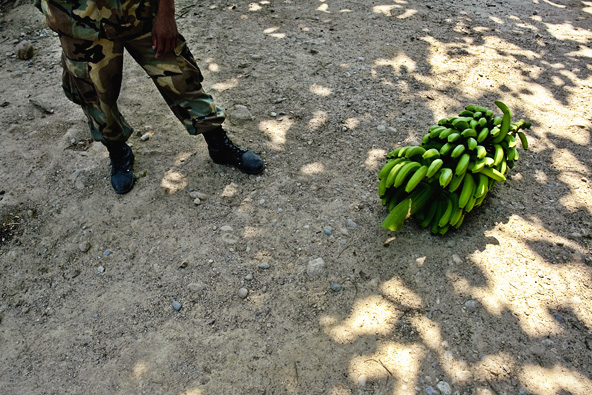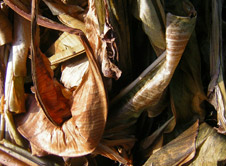
Aracataca, Colombia, 2007. A Colombian soldier stands next to a cut bunch of bananas. Colombian soldiers often worked hand-in-hand with right-wing paramilitaries to fight people with suspected
sympathies to Marxist guerillas. Many civilians lost their lives in a period of indiscriminate killing,
much of which had to do with control of coca production and smuggling routes.
Photo: Jan Sochor
After the killings in Ciénaga's central square, the Abadía Mendez government was voted out of power and the company found its business interests threatened. United Fruit needed a sympathetic national government to guarantee its profits and it had just vanished. Unlike the Central American nations, United Fruit did not control Colombia and could not overthrow its government so it was forced to make deals with the workers. Between popular Liberal politicians, who now openly supported labor unions against the company, and the disruption of shipping caused by the Second World War, the octopus slowly withdrew from Santa Marta, selling its land back to the national land reform agency at a good price, saving the company from having to abandon its assets. It was time to move on.
In 1963, United Fruit found what it was looking for in Urabá, a long neglected but well-watered Caribbean region of Antioquia, Colombia, closer to Panama than Santa Marta. It was perfect. In the nearby fishing village of Turbo, United Fruit then repeated its well-worn and successful pattern. The company found an underdeveloped stretch of coastline, offered to build a port and bring in jobs in exchange for export concessions, then hung on as long as possible in the face of violent uprisings and popular discontent. What they tried desperately to avoid was the labor unrest that set them back in Santa Marta in the early part of the century. To get around it, United Fruit created an entirely new system of production. It was brilliant; they would create a virtual banana operation.
The big innovation was simple-the company wouldn't own land at all. If United Fruit owned land, the workers would agitate against them. Instead, Colombian growers would own it and sell their entire crops to the company as contractors. United Fruit put ads in the paper looking for investors and they got people who had never worked on a farm in their lives. Dentists and doctors suddenly became ranchers in Urabá. It was a gold rush for cheap land and the promise of big profits with the octopus. To get the growers started in business, the company handed out big development loans to the new arrivals from Medellín who proved they could cultivate bananas. With the loans and the contracts, the company locked the growers into an exclusive arrangement, and for the next five years, one hundred percent of everything grown in Urabá went out on United Fruit freighters at the price the company set. Meanwhile, another conservative government in Bogotá promised to hunt down leftist dissenters and hold back the tide of Communism in the hemisphere, a crackdown that would have terrible consequences for the country. In 1966, three years after United Fruit arrived in Urabá, a group of liberal intellectuals that the government had been chasing across the country founded the Revolutionary Armed Forces of Colombia (FARC), and Colombia plunged headlong into forty years of civil war.
It was bound to happen. In the 1980s, communist revolutionaries arrived in the banana fields of Urabá after a period of calm and high profits for United Fruit. The promise of the rebels was electrifying and straightforward: "You are poor, the company is rich, and this land could be yours if you are willing to take it." Of course, this was nearly the same promise the company dangled before the growers. Groups like FARC successfully infiltrated the unions and kidnapped the managers of the farms. But profits continued to climb; Urabá looked like a good investment for the company except for the violence, which accelerated steadily into the 1990s. Then, in 1997, the AUC arrived in force and offered to solve everyone's problems. One of the first items on its agenda was to meet with company officials.
The company, in the meantime, had changed its name from United Fruit to Chiquita, a deliberate reincarnation in the form of the smiling, bananaform woman who the firm hoped would distract the public from its dark history.
A man stood next to me holding camera gear and a satchel. A foreigner dressed too warmly for the climate, scanning the street for landmarks. If he'd been born five hundred years ago, Carlos Santa Maria Villalon would have discovered the New World in a rented ship. It was his destiny instead to grow up under Pinochet in Chile, where he was arrested dozens of times and his friends were tortured. One of the major side effects of the dictatorship on Carlos is that he hates cops of any description. Authority does not impress him and he does not like people who seek its favors. When he goes to hell, it will be a cop-filled and superheated Miami where he is imprisoned for all eternity without any money. Carlos does much better with drug dealers, petty criminals and sometimes the poor. And like all revolutionaries, he's ugly to look at but in his face there are moments of truth.
Carlos had arranged for us to meet with Captain Jaime Garcia of the Guardacostas in the port of Turbo. Captain Garcia offered to take Carlos out on a drug interdiction patrol on one of his fast boats and now I'd been invited along for the ride. "This could be bullshit," Carlos said, looking around for the bus to Turbo. "It could be interesting," I said. "I am thinking it could be total bullshit, you know, a pony show." "A dog and pony show." "Exact."
 LEAD IMAGE: Dried banana leaves.
LEAD IMAGE: Dried banana leaves. Photo: Unknown
© Phillip Robertson, 2009-2014.
